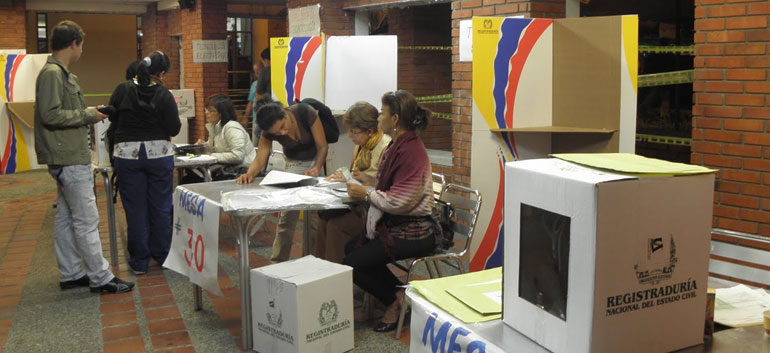In the more than two months since Colombia held its congressional elections, the final outcome of the races for two House of Representative seats from the country’s most impoverished state have been suspended as claims of voting irregularities are investigated.
Heading into the March 9 poll, the national Ombudsman’s Office predicted that 20% of the municipalities in the northwestern state of Choco were at extreme risk for voting violations, while the independent Mission for Electoral Observation (MOE) found a likely possibility of voter fraud in much of the state.
Evidence surfaced following the elections that large-scale election manipulation did indeed occur in parts of Choco, as it was believed to have occurred elsewhere in the country, as well.
Early election returns indicated that the first seat would be won by Liberal Party (Partido Liberal) candidate Nilton Cordoba but that the second would come down to a close finish between Jose Bernardo Florez and Melania Valois, both of the U Party (Partido de la U). With 80 votes separating the two candidates, no further results were released that night, although not all tables and municipalities had declared.
No new information came through from official channels the following day, either, while in Choco whispers of a cover-up began spreading, especially seeing as some of the undeclared tables were located in Quibdo, within miles of National Registrar office where the final results were being announced. It soon became clear that with such close results for the second seat and the delay in the release, questions were going to be asked and allegations made.
In the following weeks, a litany of evidence and testimony regarding voting irregularities has been presented. The two candidates, Edward Tito Torres and Melania Valois have been involved in gathering and presenting evidence of voting irregularities first in front of the electoral registry in Quibdo and then in Bogotá in the National Electoral Council (CNE). The claims relate to over 1000 votes in various municipalities of the region including Bojaya, Rio Sucio, Bajo Baudo and Quibdo.
Bojaya
In the municipality of Bojaya, evidence has been presented that seems to show that votes were registered by people who did not and could not have voted that day. Pablo Bustos, national director of the Citizen Oversight Network, claims that votes appeared in the name of deceased people, people who no longer live in the locality and did not return to vote, and people who were too sick to vote that day.
The El Espectador newspaper tells the story of Jose de la Cruz, whose death certificate was registered in 1998 but who was recorded as having voted in Bojaya during the most recent elections. His was not a unique case, the most shocking examples of this form of fraud being those victims of the infamous 1992 Bojaya Massacre — in which almost 200 people were killed by the FARC rebel group — whose names appear on the 2014 voter registry.
Of the various so-called ghost votes that have been presented to the National Electoral Council (CNE), the majority were for Florez, who didn’t visit the municipality during the election period but won a good deal of its votes. Bustos suggests that the fraud was executed with the help of ex-Mayor Joaquin Palacios, who has been denounced for alleged involvement with paramilitary elements that continue to operate in the state, and whose son is among Florez’s advisers.
Florez argues, however, that his popularity in the Bojaya is a product of the family connections he maintains in the municipality, while his lawyer has concluded that the irregularities would not be sufficient to swing the election results.
Quibdo
In the regional capital of Quibdo, the CNE delegates found that blank and annulled votes did not appear in the municipality’s final count. Valois’s lawyer has claimed that the verification process also revealed uncounted votes for his client.
CNE
Due to the claims that have been made, the CNE has suspended the confirmation of the winning candidates and the House of Representatives seats remain undecided.
There was a hearing in front of the CNE at the beginning of May and a decision is still being awaited as to whether the votes from these municipalities where irregularities have been uncovered will be discounted and, ultimately, which of the U Party candidates will win the second seat.
While a decision is being reached, citizens in Choco still do not know who will be representing their state in the next session of Congress.
Choco has among the highest poverty rates in the county and unemployment levels are almost double the national average. Last week, almost 3,000 people were forcibly displaced by violence between illegal armed groups active in the state.
Effective representation by competent and ethical individuals is keenly desired by the region’s people.
Sources
- Observatorios a la democracia (MOE)
- El gran fraude electoral en Choco (Semana)
- Citizen Oversight Network (Red de Veeduria)
- Los muertos votaron en Choco: Red de Veedurias (Caracol Radio)
- Asi fue fraude electoral en Choco (El Espectador)
- INFORME ESPECIAL POR RIESGOS DE VIOLACIONES A LOS DERECHOS HUMANOS Y AL DIH EN EL PROCESO ELECTORAL 2014 (Sent out by Colombia’s Ombudsman’s Office)


